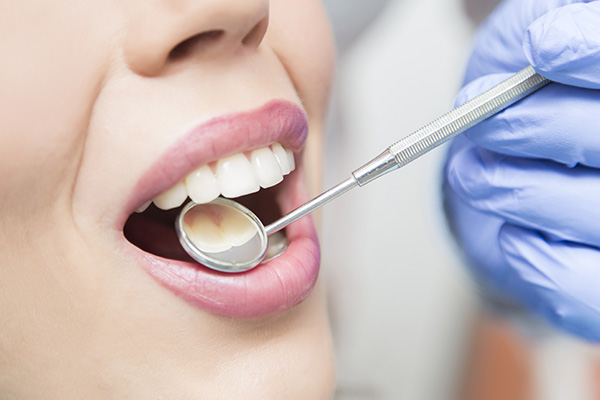 General dentistry screens patients for oral cancer regularly. Your dentist performs this screening to look for any signs of cancer or precancer in your mouth. By detecting cancer early, there is a better chance of successful treatment. For many, an oral cancer screening is a routine part of the dental exam. General dentistry is more likely to perform the oral cancer screening if you have any of the risk factors associated with oral cancer. Here is a little more about what to expect.
General dentistry screens patients for oral cancer regularly. Your dentist performs this screening to look for any signs of cancer or precancer in your mouth. By detecting cancer early, there is a better chance of successful treatment. For many, an oral cancer screening is a routine part of the dental exam. General dentistry is more likely to perform the oral cancer screening if you have any of the risk factors associated with oral cancer. Here is a little more about what to expect.
What is oral cancer?
Abnormal cell growth in the mouth or throat can become oral cancer. Cancerous growths can happen on the lining of the lips, the inside of the mouth along the gums, the cheeks, and the tongue. Oropharyngeal cancer is when the growths develop at the base of the tongue, on the tonsils, on the soft palate, or along the walls of the throat. Not all growths that the dentist finds in the mouth are cancerous. The dentist can take a biopsy to determine if the growth is concerning.
The oral cancer screening
The dentist will use gloved hands to examine the patient’s mouth. During this general dentistry exam, the dentist is looking for any discolored patches or sores, as well as any unusual lumps in the mouth or throat. Some dentists also use a special light that can highlight any unhealthy tissue. There is also a special dye the patient can swish in their mouths that will cause abnormal cells to show up as blue. Patients should also talk to the dentist about any risk factors that would make the patient more likely to develop oral cancer.
Touch is important
An oral exam is not only a visual exam of the mouth. The dentist will feel the patient’s throat and face on the outside. However, it is also important for the dentist to feel the inside of the mouth. This is to detect any hard lumps of tissue. For many people, oral cancer is painless in the early stages, but a dentist can detect many cases. Not every abnormal growth turns out to be cancer. But early detection is valuable because catching oral cancer early gives the patient a much better prognosis.
Risk factors for oral cancer
Although many dentists will perform a screening on every patient, some risk factors can increase the chances of oral cancer developing. Men are twice as likely as women to develop oral cancer. Those over the age of 55 and those exposed to human papillomavirus (HPV) are also more at risk. Smokers and people who consume alcohol regularly are also at a greater risk independent of their age.
Oral cancer screening in general dentistry
If your dentist finds anything of concern, you will go back for a follow-up visit. You should make a list of questions you want to ask the dentist before going for your visit. Your dentist will walk you through the procedure and what the screening looks for. Getting an oral cancer screening is a good way to stay on top of your oral health.
Request an appointment or call Smiles By Julia at 954-271-8034 for an appointment in our Fort Lauderdale office.
Related Posts
Tooth pain is one of the most common reasons people visit a general dentistry clinic, where they may receive a filling or other type of repair for a damaged or decayed tooth. However, in some cases, the tooth in question may be too far gone, and extraction is necessary. While this may be distressing for…
In general dentistry, practitioners offer preventative, restorative, and cosmetic services. General dentists help patients maintain good oral health by preventing disease and decay. For example, when individuals visit their general dentists' office for tooth decay, the dentist can diagnose, clean the decay, and fill the tooth. General dentists understand how oral health affects an individual's…
In general dentistry, the dentist examines, diagnoses, and treats a patient's teeth for various conditions and damage. According to the ADA, about 80% of all dentists choose general dentistry for their practice. Your first point of contact for dental conditions, malformations, or decay is your general dentist.In general dentistry, dentists always attempt to save a…
